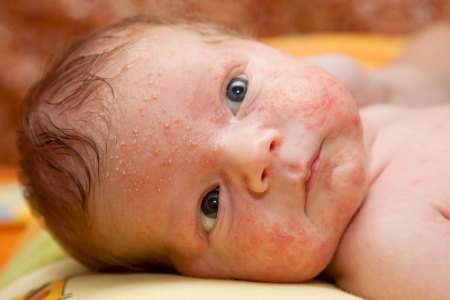How Your Newborn is Growing?
This week your little one is three weeks old, only a week short of the one month mark. He is growing little by little each day and exhausting as it may be, it is a wonderful and enriching experience. The early days are tough as you are in the learning phase and have not yet cracked the crying code. Yes it’s a code because crying is the only way the baby has to express himself. It is not in an attempt to harass you. Babies are known to cry maximum in the first three months of their life. So bear with it and be very vigilant about your baby’s crying times. Gradually, you will learn to differentiate the “hunger” cry from the “i am wet” cry to “just hold me” cry of your newborn baby week 3. Here are some of the basic parameters that mark your baby’s growth.
Newborn Baby Week 3 – Growth and Development
- Feeding: Feeding 3 week old baby is a time consuming task and the feeding sessions can last for 30-40 minutes. The baby is small and sucking takes effort. You may also notice that the baby falls asleep while sucking many a times. You must tickle the soles or play with his ears to rouse him and make him start drinking again. If you are wondering how much should a 3 week old eat, it is still somewhere between 20-30 ml of breast milk or formula feed. There is no way to measure how much breast milk your baby is having unlike formula which can be measured exactly. You will need to rely on your baby’s cues to judge whether he is getting enough milk. If the baby is happy after a feed, making 6-8 dirty diapers a day and has a good skin tone, then you can be rest assured that all is well. However, an insufficient feed can make your 3 week old baby fussy all the time. So, make sure that you keep a track of how much milk your baby drinks during his breastfeeding week 3 sessions.

- Sleep: Is your little 3 week old baby sleeping a lot? In the initial few weeks, your little one will sleeping for most part of the day. The wakeful hours will increase slowly with each passing week. Baby sleep 3 weeks could be between 16-18 hours a day. You can follow some steps to help your baby sleep better. The baby will sleep every 2-3 hours. 3 weeks baby not sleeping through the night is nothing to worry. Your baby is still adjusting to the outside world and the orientation of day and night is still not there. Try to keep the mornings noisy and bright and night feeds dull and boring. Gradually the baby will learn to differentiate and a routine will set in.
- Vision: Your baby eyesight at 3 weeks is slowly increasing each day and now he can identify zig zag pattern better. He loves to see your face and hear your voice. Try putting up a crib mobile and see him stare hard at it. Following objects with the eyes is still a few weeks away.
- Stool: Breastfed babies have thin, seedy mustard color stools and they tend to pass stool as frequently as few times a day, mostly after each feed. Formula milk drinking babies have denser and fewer stools. Since the gastrointestinal tract is in a maturing phase, be ready for some noisy farts from that cute little butt. Gas formation is common in babies this age. It is also a reason for the much dreaded infant colic. Diaper care is very essential in the early weeks as your baby could get diaper rashes. So be extra careful and change the diapers every few hours.
- Colic: This dreadful event can happen between weeks 3 to 6 of the baby’s life. You may notice uncontrollable crying in an otherwise healthy baby more in the evening times. The exact cause is not known but it is believed to be due to the maturing digestive system of the baby or due to changing temperament of the baby which allows him to be over stimulated easily. The diagnosis of colic is done on the basis of rule of three. Baby crying for more than three hours, for three days a week, for three weeks in a row is diagnosed as colic. This problem normally doesn’t last beyond three months and resolves on its own. You could soothe your little one by holding him close, swaddling or rocking motion. Always see your pediatrician if you suspect colic as few other conditions need to be ruled out.

How is Your Life Changing?
Around the three week mark most mothers are getting better at handling their babies. Your newborn baby week 3 is slowly getting accustomed to the new environment. Some mothers may not feel an immediate rush of love on seeing their baby. This is normal as bonding takes time and there is nothing to worry. If you have more severe symptoms then visit your doctor to rule out post-partum depression.

Important for This Week – Newborn Baby Week 3
- Breastfeeding Problems: For a first time mother, breastfeeding is never a enjoyable experience. However, if you take the help and follow the suggestions as mentioned by your doctor or midwife, breastfeeding can become the best bonding time for you and your baby. Look for symptoms such as sore nipples, fissures on nipples, itchiness, pain while feeding, bleeding nipples, etc. which lead to feeding problems. Also try the various breastfeeding positions to help the baby latch better. Consult your doctor right away if nothing works.
- Baby Acne: Appearing similar to teenage acne, baby acne can be present since birth or may appear after a few weeks of your baby’s birth. However there is no particular reason why they appear on your baby’s skin. Based on researchers, the possible reason for baby acne is the change in hormones that is initially received from the mother during pregnancy and later produced by the baby itself. However, there can be other factors responsible for baby acne.
- Baby bath-time: Sponge baths are the best way to cleanse your baby in the first few weeks. Use a wet warm washcloth and wipe his face, hands and neck frequently. Also remember to clean the genital area properly and carefully. Once the stump of your baby’s umbilical cord falls off, you can then give your baby a proper bath in a small baby tub or your sink. Simply remember not to leave your baby alone in the tub and to check the water temperature before giving bath to your baby. A maximum of 5 minutes is enough for you to clean your baby.
<<< Newborn Baby Week 2 | Newborn Baby Week 4 >>>


